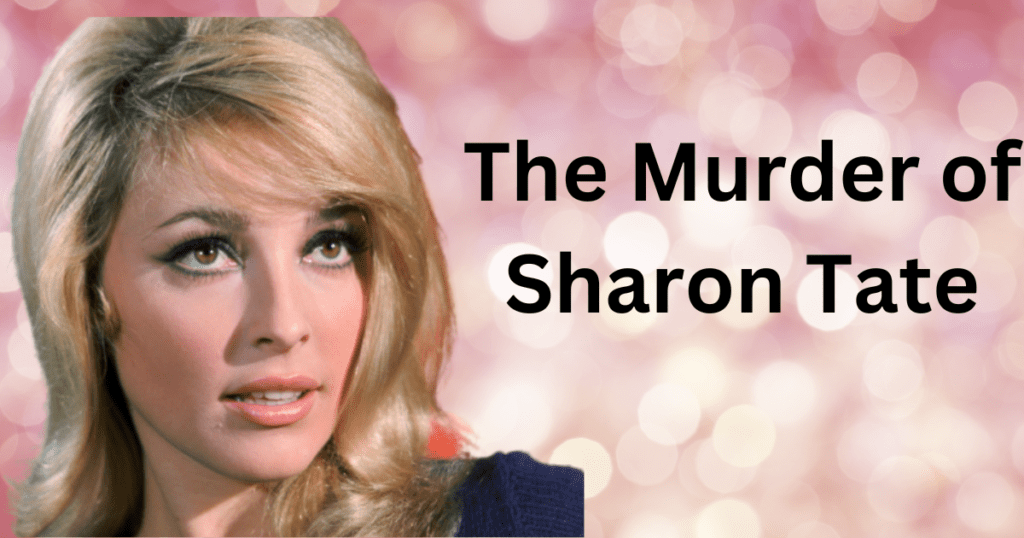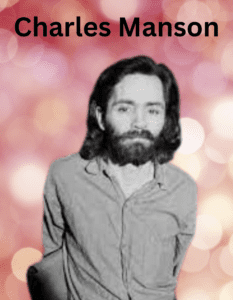On August 9, 1969, the brutal murder of Sharon Tate and four others shocked the world and brought the dark side of Hollywood into the spotlight. The tragedy sent shockwaves through the entertainment industry and society as a whole, leaving an indelible mark on popular culture. This article will explore the events leading up to the murder, the key players involved, and the aftermath of this horrific crime.

The Background
Sharon Tate was a rising star in Hollywood in the 1960s, known for her beauty and acting talents. She had appeared in several movies, including “Valley of the Dolls” and “The Fearless Vampire Killers.” Tate was married to director Roman Polanski, and she was eight-and-a-half months pregnant with their child at the time of her death.
The Murder
On the night of August 9, 1969, Tate and several others were at her home on Cielo Drive in Los Angeles. Among the group were Tate’s friend and hairstylist, Jay Sebring, her former lover, Wojciech Frykowski, and Frykowski’s girlfriend, Abigail Folger. Also present was a young man named Steven Parent, who was visiting the caretaker of the property.
Around midnight, four members of the Manson Family, a cult led by Charles Manson, entered the house and began a brutal attack on everyone inside. The victims were tied up, beaten, and stabbed multiple times. Sharon Tate pleaded for her life and that of her unborn child, but the attackers showed no mercy. The horrific massacre left five people dead, including Tate and her unborn child.
The Key Players

The Manson Family was a cult-like group of young people who followed Charles Manson, a charismatic but unstable leader. Manson had convinced his followers that he was a messiah figure and had predicted an apocalyptic race war that he called “Helter Skelter.” Manson believed that this war would be sparked by a series of murders, which his followers carried out at his behest.
Charles Manson himself did not participate in the Tate murders, but he was the mastermind behind them. The four attackers were Susan Atkins, Patricia Krenwinkel, Tex Watson, and Linda Kasabian. All were members of the Manson Family.
The Aftermath
The murder of Sharon Tate sent shockwaves through Hollywood and society as a whole. The killings were particularly brutal, and the fact that Sharon Tate was eight-and-a-half months pregnant added to the horror. The murders marked the end of the hippie era and the beginning of a more cynical, violent period in American history.
The trial of Manson and his followers was a media sensation, with daily updates on the proceedings. Manson himself became a cultural icon, with his wild-eyed stare and swastika tattoo appearing on t-shirts and posters. Manson and several of his followers were sentenced to death, but their sentences were later commuted to life in prison when the death penalty was abolished in California.
The Legacy
The legacy of the Tate murders is a complicated one. On the one hand, the killings brought the Manson Family and their twisted ideology to national attention, leading to greater awareness of cults and their dangers. On the other hand, the glamorization of Manson and his followers in popular culture has been criticized as glorifying violence and criminal behavior.
Conclusion
The legacy of the murder of Sharon Tate is one of tragedy and loss. She was a talented actress with a bright future ahead of her, but her life was taken by a senseless act of violence. The murder also had a lasting impact on Hollywood and society as a whole, reminding us of the dangers of extremism and the need for vigilance in the face of violence.
Beneath the tragedy and horror of the murder of Sharon Tate lies a deeper question: how could such a terrible act of violence occur? The answer lies in the twisted ideology of Charles Manson and his followers, who believed in a warped vision of race war and apocalypse. While Manson and his followers are now infamous for their role in the murder of Sharon Tate, their legacy remains a chilling reminder of the potential for violence and extremism in our society.
Sharon Tate Movies
| Movie Title | Release Year | Director | Lead Actor/Actress |
| “The Fearless Vampire Killers” | 1967 | Roman Polanski | Sharon Tate, Jack MacGowran |
| “Eye of the Devil” | 1966 | J. Lee Thompson | Deborah Kerr, David Niven, Sharon Tate |
| “Valley of the Dolls” | 1967 | Mark Robson | Barbara Parkins, Patty Duke, Sharon Tate |
| “Don’t Make Waves” | 1967 | Alexander Mackendrick | Tony Curtis, Claudia Cardinale, Sharon Tate |
| “The Wrecking Crew” | 1968 | Phil Karlson | Dean Martin, Elke Sommer, Sharon Tate |
| “12 + 1” | 1969 | Nicolas Gessner | Vittorio Gassman, Sharon Tate |
| “The Thirteen Chairs” | 1969 | Nicolas Gessner | Vittorio Gassman, Sharon Tate |
| “The Haunting of Sharon Tate” | 2019 | Daniel Farrands | Hilary Duff |
| “Once Upon a Time in Hollywood” | 2019 | Quentin Tarantino | Margot Robbie |
Books about Sharon Tate
| Book Title | Author | Year Published |
| “Helter Skelter: The True Story of the Manson Murders” | Vincent Bugliosi and Curt Gentry | 1974 |
| “Sharon Tate: A Photographic Album” | Petra Hammesfahr | 1994 |
| “Sharon Tate and the Manson Murders” | Greg King | 2000 |
| “The Life and Times of Sharon Tate” | Ed Sanders | 2001 |
| “Restless Souls: The Sharon Tate Family’s Account of Stardom, the Manson Murders, and a Crusade for Justice” | Alisa Statman and Brie Tate | 2012 |
| “Tate-LaBianca Homicide Research Guide: 1969-1971” | Clark A. Hensley | 2013 |
| “Manson: The Life and Times of Charles Manson” | Jeff Guinn | 2013 |
| “Sharon Tate: Recollection” | Debra Tate | 2014 |
| “Member of the Family: My Story of Charles Manson, Life Inside His Cult, and the Darkness That Ended the Sixties” | Dianne Lake and Deborah Herman | 2017 |
| “The Manson Women and Me: Monsters, Morality, and Murder” | Nikki Meredith | 2018 |
| “Sharon Tate: A Life” | Ed Sanders | 2020 |
Movies about the murder of Sharon Tate
| Movie Title | Release Year | Director | Lead Actor/Actress |
| “Helter Skelter” | 1976 | Tom Gries | Steve Railsback, Marilyn Burns |
| “The Killing of America” | 1981 | Sheldon Renan, Leonard Schrader | Chuck Riley, Ed Dorris, Thomas Noguchi, Paul Holsinger |
| “Manson Family Movies” | 1984 | John Aes-Nihil | Sandra Good, Bruce Davis, Lynette Fromme |
| “The Manson Family” | 1997 | Jim Van Bebber | Marcelo Games, Marc Pitman, Leslie Orr |
| “The Sharon Tate Murders” | 2000 | John Aes-Nihil | Joleigh Fioravanti, Marcelo Games |
| “The Manson Family” | 2003 | Jim Van Bebber | Marcelo Games, Marc Pitman, Leslie Orr |
| “Helter Skelter” | 2004 | John Gray | Jeremy Davies, Clea DuVall, Allison Smith |
| “Manson, My Name is Evil” | 2009 | Reginald Harkema | Gregory Smith, Kristen Hager |
| “House of Manson” | 2014 | Brandon Slagle | Devanny Pinn, Reid Warner |
| “Charlie Says” | 2019 | Mary Harron | Matt Smith, Hannah Murray |
| “The Haunting of Sharon Tate” | 2019 | Daniel Farrands | Hilary Duff |
| “Once Upon a Time in Hollywood” | 2019 | Quentin Tarantino | Margot Robbie |
FAQ about the murder of Sharon Tate.
Who killed Sharon Tate?
Sharon Tate and four others were killed by members of the Manson Family, a cult led by Charles Manson. Manson was not present at the scene of the crime but was the mastermind behind the killings.
What was the motive behind the murders?
The motive behind the murders was part of Charles Manson's twisted ideology, which included a belief in an apocalyptic race war that he called "Helter Skelter." Manson believed that the murders would spark this war and that he and his followers would emerge as the victors.
What was the outcome of the trial?
Charles Manson and several of his followers were convicted of murder and sentenced to death. Their sentences were later commuted to life in prison when the death penalty was abolished in California.
What impact did the murder of Sharon Tate have on Hollywood?
The murder had a significant impact on Hollywood, leading many celebrities to become more security-conscious and cautious.
What is the legacy of the murder of Sharon Tate?
The legacy of the murder is one of tragedy and loss, reminding us of the dangers of extremism and the need for vigilance in the face of violence.
Click here for more crime stories
2 thoughts on “The Murder of Sharon Tate: That Shook Hollywood in 1969”